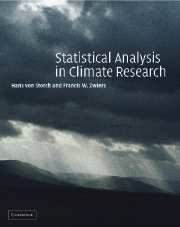Book contents
4 - Concepts in Statistical Inference
Published online by Cambridge University Press: 03 February 2010
Summary
Overview. Our purpose here is to introduce some basic ideas about how information is extracted from data. Section 4.1 deals with the fundamental concept of ‘inference.’. The keywords here, ‘estimation’ and ‘hypothesis testing’ are introduced in a rather intuitive manner. The technicalities will be explained in detail in Chapters 5 and 6. However, special attention is given to the type of knowledge that can be gained under certain circumstances. This is done by presenting simple examples and discussing the logic that is applied. Two other fundamental concepts, sampling (i.e., gathering empirical evidence) and statistics (i.e., the condensation of the raw empirical evidence into a few useful quantities), are introduced in Sections 4.2 and 4.3.
General
Inference. The word inference is central in statistical analysis. A dictionary definition of inference [150] rephrases ‘to infer’ as ‘to conclude by reasoning from something known or assumed.’ A broad definition of statistical inference could be ‘the procedure that involves extracting information from data about the process underlying the observations.’
There are two central steps in this process.
1 A statistical model is adopted that supposedly describes both the stochastic characteristics of the observed process and the properties of the method of observation. It is important to be aware of the models implicit in the chosen statistical method and the constraints those models necessarily impose on the extraction and interpretation of information.
[…]
- Type
- Chapter
- Information
- Statistical Analysis in Climate Research , pp. 69 - 78Publisher: Cambridge University PressPrint publication year: 1999

